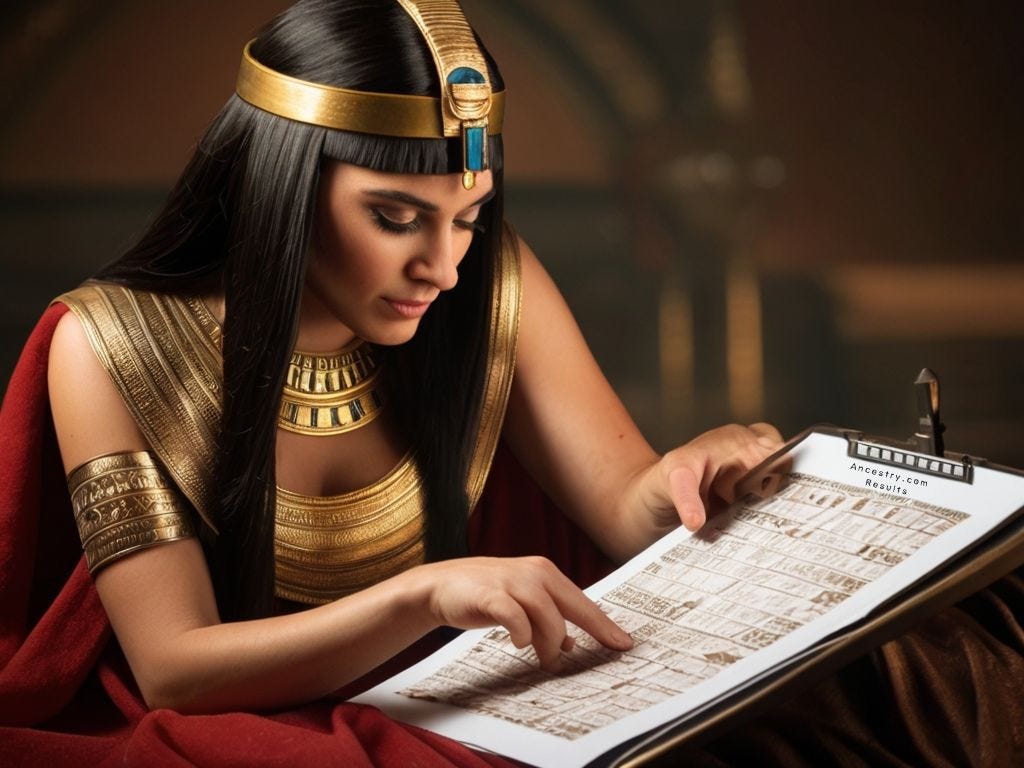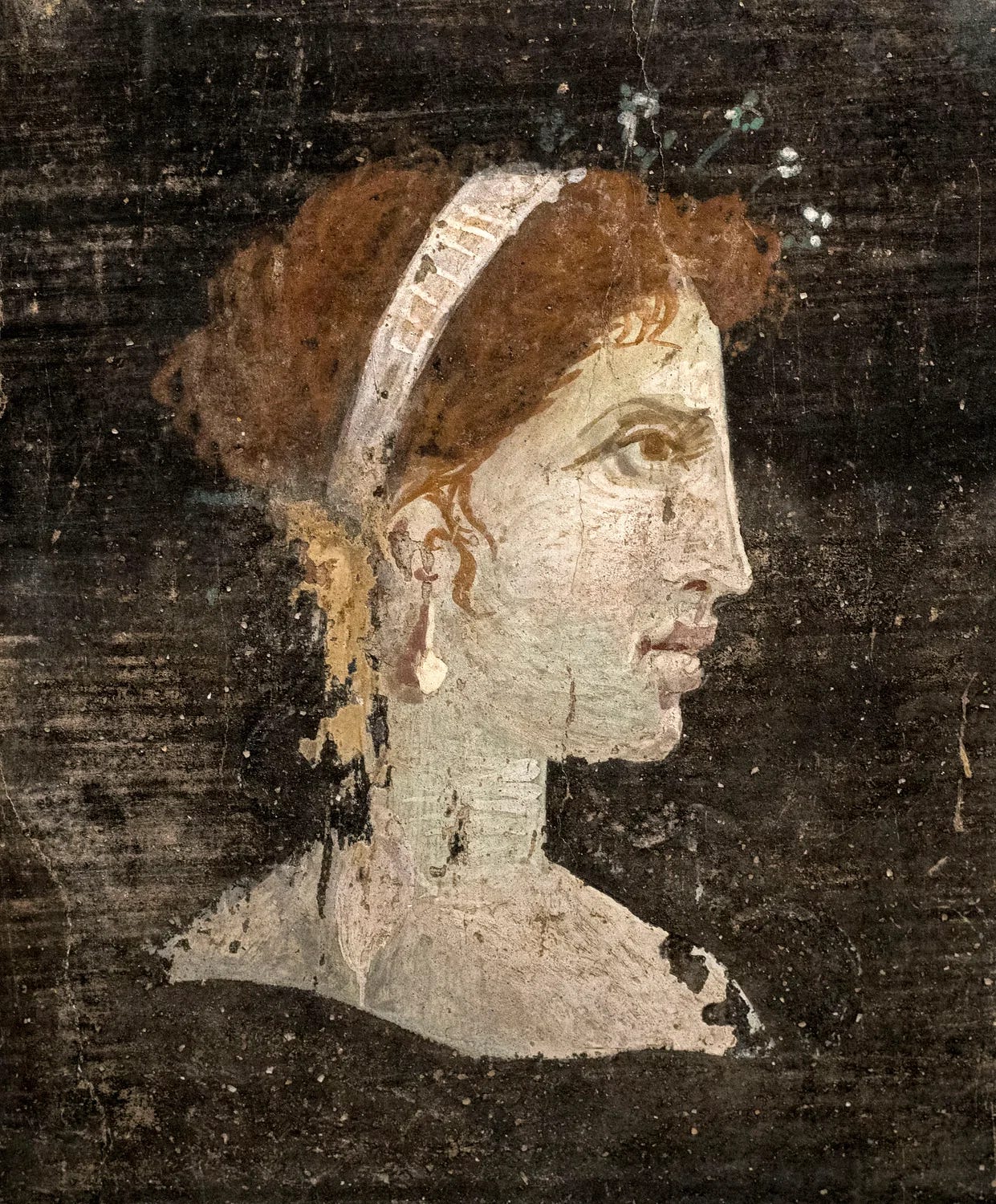Last near Netflix drew criticism over a documentary which portrayed Cleopatra (the VII, that Cleopatra), pharaoh of Egypt, as a black African queen. British actress Adele James who, according to her Wikipedia page, is half Jamaican and half English, played Cleopatra in the documentary. Was it cultural appropriation for Netflix to claim a Greek/Egyptian Queen as sub-Saharan black? What ethnicity was Cleopatra really?
This whole controversy is, of course, born of race neuroticism of the late 2010s/early 2020s, and an Afrocentrism movement which appeared to both try to highlight black African history and culture (good!) but also maybe claim ownership of some historical figures and cultural accomplishments that had little to do with sub–Saharan Africa (maybe not so good).
Of course, it’s also the season of Cleopatra. A forthcoming movie on the Queen starring Israeli actress Gal Gadot generated its own race controversy over “whitewashing”. This, in turn, generated a backlash as people observed Gadot is not “white” in the American sense but being Israeli, has middle eastern roots. As if this weren’t enough controversy yet another Cleopatra film is apparently in the works reportedly starring Zendaya. Zendaya is of mixed Nigerian, Scottish and German ethnicity (again, thanks to her Wikipedia page) which naturally stirred up accusations of “blackwashing” just like the Netflix documentary. People sure are using a lot of colors to wash with.
So…who was Cleopatra really and does it all matter?
I’d just been reading The Story of Egypt by Joann Fletcher which, about as well as anyone can, tries to trace Cleopatra’s lineage. As Fletcher puts it, this is not easy to do both because the ethnicity of some of the females in her family tree (“minor” wives and such1) are unknown, but also because Cleopatra’s genealogy was closer to a cobweb than a tree. This was because the Ptolemaic dynasty from which she came had a generations-long history of incestuous marriage.
The short version is that the Ptolemies were Macedonian Greeks2, so basically everyone got this particular controversy wrong (including some of the irate Egyptians3). There are some nuances here, but the simple fact is that if ethnic fidelity was the main concern, the safest thing would be to have Cleopatra be played by a Macedonian Greek actress4. There is some evidence that at least one distant relative, Cleopatra I, wife of Ptolemy V, was half-Persian5. Now the Ptolemies were polygamous, and it’s likely some degree of ethnic Egyptian blood got into the family line, though tracing it to Cleopatra VII with any degree of reliability seems thorny. There’s no evidence I’m aware of that she had any sub-Saharan black ancestry. Some clever folks have also tried to reconstruct what Cleopatra might have looked like from busts and contemporary portraits. You can see their results here.
Thus, of the three films, the Netflix documentary is the worst offender as they implied a factual truth for which there is little to no evidence6. For fictional movies…maybe we shouldn’t care if the race of the actress matches that of Cleopatra? Presumably both Gal Gadot and Zendaya were picked mainly because they are popular actresses that will bring viewers to the theater (a hope likely sabotaged by making two films about the same person in such a short span). But…if we’re going to go down this alley (and I’m generally fine with it), there can’t be double standards. If we’re going to have black actresses play historically white roles (as Zendaya is doing for Cleopatra), then we have to also be ok with white actresses playing historically black roles. Not to do so is a racial double standard. Such a double standard basically is racism and in a multiethnic country, that’s just not going to end with any kind of kumbaya and people are delusional if they think it will. If you want to promote racial harmony, don’t do things guaranteed to cause racial resentment.
Ultimately, I think the underlying issue for why some seem to be appropriating non-black historical figures like Cleopatra is simply because Hollywood, history teachers, even the people screeching at BLM rallies, have done a crap job of highlighting the complicated story of African history. Nor has Hollywood been good about using African folklore for, say, Disney movies. This is a shame. I’m not at all an expert on the history of Africa, but I know just enough to understand there are interesting stories to tell there…both glorious empires, heroic figures, but also considerable darkness including the awkward fact that Africans not only enslaved each other but traded in white slaves. This bit is so awkward, in fact, that after 2020, people seemed to tie themselves in knots to wave it away as no big deal7. But there’s also a lot of awesome stuff and a lot of great stories to tell, and interesting figures to learn about. The 2022 movie The Woman King appears to be an excellent example of the potential here (although it too was criticized for downplaying the role of black Africans in the slave trade).
I think there was a similar phenomenon at play in the controversy over the casting of Halle Bailey in the 2023 Little Mermaid, a culturally Danish story. I’m not exactly losing sleep over this movie as I’m hardly the target audience, but it seems that the bruhaha could have been avoided simply by telling a fresh story from Africa rather than doing a tired remake of a beloved Danish classic while swapping the race of the lead. Again, there’s an argument for making race irrelevant in casting but the wide (and correct, I think) perception is that there’s a double standard at play.
I’ve said it before, and I’ll say it again: let’s see some great stories from Africa. And if we’re going to cover history, we should do so honestly, including the good and the bad, just as we should with any other region. Most history is pretty brutal, which is a lot of what makes it interesting.
But final ruling: Cleopatra was (mainly) Greek.
This is the term ancient Egyptians used to contrast with the Great Royal Wife (or similar designations for missus #1). However, many pharaohs were born of minor wives, so it wasn’t a hard distinction.
The original Ptolemy was one of Alexander the Great’s generals. On Alexander’s premature deathbed, Alexander had the great idea of letting his generals fight over his recently conquered empire, which worked out about as well as you’d imagine. Ptolemy ended up with the Egyptian bit.
Thought Macedonian Greeks, the Ptolemies did adopt a lot of Egyptian customs, albeit it would only be Cleopatra VII herself who ultimately bothered to learn the contemporary Egyptian language. Nonetheless, modern Egyptians could make the argument Cleopatra was culturally Egyptian even if genetically Greek. I think that’s a sound argument.
In one interview Ms. Gadot implied such an actress was difficult to sign. Probably what she meant was that a famous Macedonian Greek actress was hard to sign. Surely, modern Greece can produce a few decent actresses and that movie could have been an opportunity to introduce one young actress, perhaps surrounded by superstar supporting actors to bring in audiences. Then again, what do I know about making movies? To the best of my knowledge, none of the actresses who’ve played Cleopatra in any of the movies down to the silent film era were Greek, even in part. Presumably the best known Greek-American actresses alive today such as Maria Menounos, Nia Vardalos or Melina Kanakaredes were too old to play the relatively young Cleopatra (sorry!)
Cleopatra I came from the nearby Seleucid Empire which I’ve seen some treat as an “aha!” moment for Cleopatra VII’s ultimate ethnic heterogeneity. Except that the Seleucid nobility were also Macedonian Greeks. Cleopatra was a popular name among these expansionist Greeks, with over 30 historically known women having the name, 7 of which became Queens of Egypt.
I’d be curious to know how well the documentary did, but streaming services are notoriously tight with viewer data. I’d guess: not well. It never seemed to create any buzz aside from the race controversy. It feels to me like something that must have seemed like a good idea in the midst of the 2020/2021 insanity but clearly was not a good idea by the time it was released in 2023.
The main arguments seem to be these. First, the scope of white slavery (at somewhere around 1-2 million slaves) was less than that of the transatlantic black slave trade (12 million, most of whom ended up in Brazil or the Caribbean). That’s true as far as it goes, although saying white slaves were “only” 1-2 million hardly wipes away the stain. Second, “white” slavery wasn’t racialized. I think that’s probably a naïve position and the notion that the North African slavers were racially egalitarian nonsensical. To be sure, what we call racism today in the US is shaped more by the transatlantic trade than other forms of worldwide slavery (much of which persists to the present day with an estimated 30-50 million current slaves worldwide). But that’s a different point from arguing that slavery in other parts of the world was innocent of ethnic prejudice. Third, that the inherited aspect of transatlantic slavery made it different from the North African slave trade. This may be true insofar as most of the white slaves have vanished to history, presumably dead.





